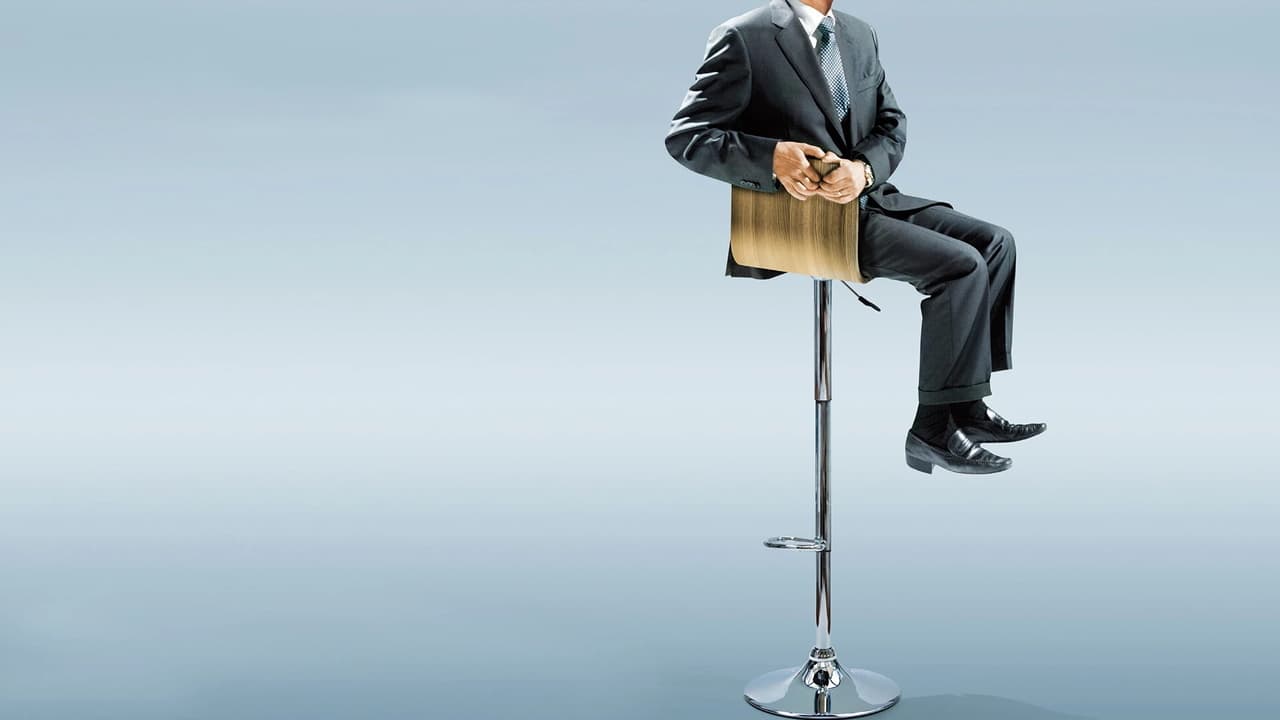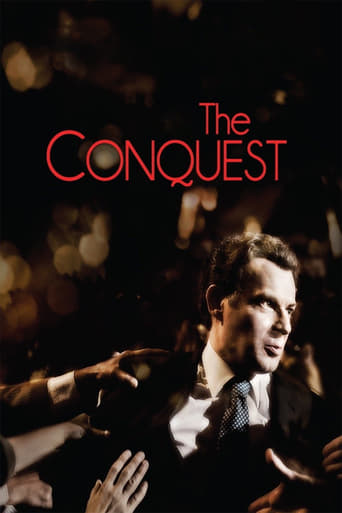

Such a frustrating disappointment
... View MoreI think this is a new genre that they're all sort of working their way through it and haven't got all the kinks worked out yet but it's a genre that works for me.
... View MoreThe plot isn't so bad, but the pace of storytelling is too slow which makes people bored. Certain moments are so obvious and unnecessary for the main plot. I would've fast-forwarded those moments if it was an online streaming. The ending looks like implying a sequel, not sure if this movie will get one
... View MoreGreat movie. Not sure what people expected but I found it highly entertaining.
... View MoreThe political life of Nicolas Sarkozy is the basis of "The Conquest", a fictional work that examines the events in his life, before and after becoming France's president. There is a disclaimer as the film opens in which a warning informs the viewer this clearly an attempt to tell the story, not exactly what happened in real life.Nicolas Sarkozy, an ambitious man, was tapped by Jacques Chirac to be his Interior minister. At the time, M. Chirac had no intention of running again. He nurtured Nicolas, whom he found to be an astute politician with charisma and chutzpah, enough to capture the voting public's imagination. Sarkozy had a formidable opponent in Dominic Villepin, who had ambitions of his own. The story deals with the intrigues and obstacles surrounding these professional politicians.The story also zeroes in Nicolas relation with his then wife, Cecilia, an intelligent woman who besides being Mrs. Sarkozy, was his adviser. It becomes imminent the deteriorating relationship between Nicolas and Cecilia. They eventually divorced. The political animal Nicolas Sarkozy was, lost much more than Cecilia in the process.Xavier Durringer directs "The Conquest" more as a farce than a real portrayal of the man. There are glimpses throughout the story of his power and prominence in the French political life, but ultimately, the film feels empty as it tries to entertain rather than examine in depth the issues that brought M. Sarkozy to power.The director achieves a coup in the casting of the main roles. Denis Podalydes reminds us of Nicolas Sarkozy's posture doing an excellent impersonation of the subject of the picture. Bernard LeCoq is perfect as Jacques Chirac, the powerful figure in French political life. Samuel Labarthe bears an uncanny resemblance to Dominic Villepin and Florence Pernel does wonders as Cecilia.
... View MoreThe premise - not of the film itself, but let's say what surrounds it, its instance as it came to be - is interesting, namely, the depiction of a nation's President in his/her rise to power and while he/she still is in power; what titillates in such a premise is I think the promise that we truly live in democratic times and that means times that can pull off the apparition of such a film sincerely, exposing the machinations and the weaknesses of a leader, as some kind of demonstration in the making that turns spectacle into some kind of self-witnessing democracy in the making.May I never write that sentence again.What is so wrong with it? It suffers from plausibility of the politically correct kind, of a stupid, biased kind. Just take some steps back and reconsider the film you saw: would you really think having seen it that the film is a demonstration, or a proof that we live in democratic times? Let's begin from the soundtrack that snaps right away: the references to Rota ground the film in Fellini territory, and so by cultural allusion we wonder if this wouldn't be more properly employed in Berlusconi's case - or is it that Berlusconi is in a way the future of - European at least - leadership, and so Sarkozy's vulgarity is a peripheral phenomenon to the standard shamelessness of Berlusconi as stand-in for the Rota/Fellini circus? But even this doubly misfires, I am afraid; I think to have a film critical of a head of state while still in power - truly, politically critical - could be the name of utopia itself, and doubly so: that means on the one hand practically it would never purely be so for at least at some point it would have to invent and so enter the ideological imagination of the script-writer (when Mrs. Almost-Ex-Sarkozy gratuitously cried towards the end I wished I had never entered the mind of this particular script-writer), or, in order to remember early 20th century propaganda frames, such a film would be a redundancy.Yet we live in biased more than propaganda times: do we need radio and press and media exposition - if we have followed the political climate and state in France during the time - turned into a semi-fictionalized account? Does this not mistake, and it is a major mistake, information for political stance, which is another name for politicizing melodrama? But maybe we are still in a frame of mind not far from the one Jean Baudrillard exposed back in the 90's when Cicciolina (remember?) was elected in the Italian Parliament: it was literally for laughs, as a face-off of politics into female impersonation.For what we have in the film are impersonators, and not actors. Perhaps there is a charm to it, watch your favorite buffoons played by some impersonators with the occasional poignant truism in their mouths here and there. But I do not want my genuine buffoon Sarkozy played - sorry, impersonated by another buffoon and spoil my male-bonding fun: and this is the crux of the matter for me: instead of just plainly turning a misconception into maybe a bad film, more importantly it turns a misconception into bad democracy anchored into macho innuendo.I admit it was a bit harder for me to digest, since the spice added to my watching experience was the remembrance of watching Podalydes as Jean-Paul Sartre some years back in a french miniseries: he was truly bad, of the same brand of badness as here, that is over-reacting the body language and confounding the demarcation between it and bodily tics, as if attacking the whole thing totally from outside, and offering us the ludicrous ruin of a theatrical alphabet; think of Louis de Funes instead as what a truly ingenious confusion of the above categories would mean each time he exploded bodily coordinates, unless one conceives Podalydes' over-reacting as the allegory of the unhappy Left: the invasion of the body snatchers into the liberal body that mistakes bodily tics for politics!Do not think of these asides irrelevant to the film - that is its ideology: they make all the more palpable the lack of political and aesthetic, cinematic decisions: to put it bluntly, if this film has some kind of political novelty - and is not as I believe something re-appropriated if not shamelessly pushed around by the liberal consensus - then it has to be supplemented by a film surrounding the rise to life of the Bruni-Sarkozy child, since it is the first time a President becomes father while in office! That would give us the glimpse to the hotness of the first lady we have so shamelessly and programmatically been declined: imagine Podalydes in seizure as he takes a baby from Laetitia Casta's bosom.May we never have to see such a film.
... View MoreI expected this movie to be fun, mostly because of the subject and i admit this kept me watching until the end. I didn't expect a comedy but I did expect a few laughs since Sarkozy does have a way of making you smile just by his appearance. Alas there is not one smile worthy scene in this movie.Other similar movies describing known outcome political events know how to provide just the touch of reality but then provide a good acted story that can be clearly fictional but interesting. This film goes the other way. It's all about looks, it looks real, political figures look and sound familiar but it seems like the whole plot has been written from press cutouts from LeFigaro et Libération.They do take a stab at romance and how political ambitions strain relationships but it is never developed or investigated, it stays in the same paper headline reality of the movie.Frankly this movie greatest flaw is that it lacks intensity. It speculates on what motivated and the decisions that maybe helped Sarkozy win the 2007 elections but it does it in such a boring way that at the end you don't know who to pity more, yourself for the wasted time/money or the ones involved in making such a lame movie.Sadly I would not recommend this movie to anyone for anything. The French glancing through newspapers headlines will already know more than what this movie has to offer. Anyone else who isn't french will probably expect a story but since it isn't there to begin with I'd save my money, maybe rent House of Cards and for the political insight that this movie offers on french politics just browse the Wikipedia pages on Chirac, Sarkozy and Villepin.
... View MoreThe other reviewer spoke about how good the imitators are here, and it's true. The actors who play the parts of Chirac, de Villepin, and a few of the other roles, look a great deal like their real-life counterparts. But that wasn't what most interested me in this very entertaining movie. This is really a no-holds-barred presentation of Sarkozy as a monomaniacal, power-hungry little despot. I couldn't imagine such a film being made about a sitting president here in the US. Even Michael Moore's depiction of Bush during the 9/11 disaster, while it ridicules him, comes nowhere close to this sort of thing. Nor does Frost/Nixon, which of course was filmed long after Nixon left office.Where fact stopped and fiction/imagination begins I didn't always know. But this is one very devastating movie, all the more so because Denis Podalydes does not settle for some sort of caricature, which, given Sarkozy's personal ticks, would have been easy. He gives a very developed, well-rounded presentation of a rather frightening, and not really funny, individual - who could learn a lot about himself by watching this movie.
... View More